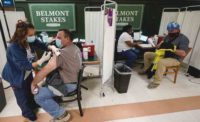The significance of the cultural shift in U.S. race relations and its impact on construction isn’t lost on Gloria Samuel.
As a Black woman who has made her career in the industry, first as a contractor manager and now as a vice president of Cincinnati's Fifth Third Bank supervising its retail construction portfolio, she says her own story came with no ready-made script and that she “had to figure it out for herself.”
Samuel did not attend college on a scholarship, she had a son to support, and she did not actually see construction as a career option.
“I just learned that you do it the best way you can [and] put the hard work in and everything else will come thereafter,” she says. “I didn't get any scholarships. I didn't know that those things were out there or that they were an option for me. Being a single parent, I just assumed that, hey, I don't qualify for a lot of those things."
A wrong assumption, Samuel now realizes, remembering that then "I didn't know the things that I didn't know. So, I didn't have any guidance really to help me through that process.”
“I just learned that you do it the best way you can [and] put the hard work in and everything else will come thereafter.”
– Gloria Samuel, vice president, Fifth Third Bank
Looking back, Samuel says what led her to her current position was improvisation and hard work that paid off.
None of that success insulated her from shock and concern after George Floyd's killing in Minneapolis on May 25, and the protests that followed.
“I didn't want to be at work [that week], because I was so worried about my two boys—especially one that just graduated college in the middle of the COVID-19 pandemic—as well as racial injustice."
She recalls her son's questions: " ‘What does the world look like for me? Do I want to be out there? Do I want to go to corporate settings and deal with, again, the divide that happens for most people in those situations?’ ” Samuel says.
Samuel well knows those corporate settings, as well as construction projects.
Unlikely Career Path
At Fifth Third Bank, one of the Midwest's largest consumer banks with more than 1,150 branches, she oversees development and implementation of retail banking center construction. This includes scope development, risk analysis, sourcing, scheduling, sequencing and assembling appropriate resources to support the company's strategic objectives.
Before joining Fifth Third in 2018, she spent 17 years in different positions at Messer Construction, the largest contractor in a region that comprises both western Ohio and eastern Kentucky, at which her efforts included bringing people of color into the organization.
Construction wasn't exactly Samuel's first career choice as a student at the University of Cincinnati.
“About the third year that I was in college, I was almost on my way out the door,” she says. "As much of a commitment that I had made to both myself and my son, it just was really, really difficult. I lived on my own. Obviously, I didn't stay on campus, that wasn't an option. Going into college, I really didn't know what to expect, nor did I know what my career was going to be.”
Samuel said she did not realize while in school that construction would be such a viable career path for her, with little knowledge of the industry or or how construction projects are managed.
“I saw it as people who allow us to have the spaces that we use,” she says. “I didn't yet realize that there could be this career that will come out of that.”
Samuel said that learning about the industry and building her place in it was something she largely had to figure out for herself.
A turning point came when Samuel became a co-op student at employee-owned Messer, which ranks at No. 76 on the ENR Top 400 Contractors list with nearly $1.2 billion in 2019 revenue and is by far the larger builder in Cincinnati. After joining the company and steadily rising from project manager to executive ranks, then-company Chairman and CEO Pete Strange challenged her to support more diverse talent.
"One of the great lies and excuses of non-performance in diversity [in construction] is this: 'Well, we'd love to have them, but they're just not there,' " says Strange, who now is retired but serves on the board of the National Fund for Workforce Solutions. "The stupidest person in the town where I grew up in Kentucky knew this about fishing: You have to go somewhere where there's fish."
Messer needed to make a conceptual leap, says Strange.
"This notion of finding the talent that you want instead of waiting for it to come to you, for Messer, came from the fact that when we became employee-owned, we embraced a capacity model instead of a market-driven model," says Strange. "Traditionally, construction has defined capacity by opportunity. If I can find a job, I'll take the job, and then I'll find the people to build the building."
He adds that because when the firm became employee-owned in 1990, "we took on a bunch of debt and a bunch of long-term obligations, we decided that, first, we would find the talent, and then we would find the projects to engage the talent, and that led us to a heightened focus on our talent supply chain."
A New Approach to Recruitment
Samuel recognized the leadership at Messer was making an effort to bring in more people of color, particularly Black students. Part of that initiative was to stop fishing for new hires from the same lakes and streams. Messer committed, at this stage, to helping recruits who couldn't make the commitment to join the firm because of living expenses or other financial concerns.
Messer began recruiting at black colleges and universities, with Samuel helping to recruit at Tuskegee University.
As Messer’s total of African-American and people of color student recruits increased, she remembers that getting new hires through the door was just the beginning.
“How do we help to support those gaps for people, recognizing that their experience is very different from the traditional student?” Samuel wondered. Financial support was one part of the equation but just a small one compared to the cultural aspects of employing recruits from the community.
“Where the divide still exists is that people are comfortable in their own space and it's very uncomfortable to have conversations about areas or things that are different,” she says.
Samuel says something as benign as office banter and activities of young people away from work could be a barrier.
Groups in the office might say, ‘Hey, let's go canoeing.’ Well, most of the time, their Black peers may not have ever experienced that," she says. “Figuring out how do you actually do activities that include everyone, it's not intentional, but it's that unconscious bias, it's what people are familiar with.”
Samuel adds that “there are some people like myself who are willing to say, ‘Oh, I'll step into that space,’ but I'll tell you that sometimes I've said, ‘no, I don't want to do that.’ I feel like I maybe have to explain myself in that scenario where, in reality, I shouldn't have to, because that's just not my experience.”
Better Messaging
During protests after Floyd's death, Samuel said she spoke with former students she mentored in the industry about messages they got from company leaders, with communications sometimes vague and not addressing what the young hires were feeling. She followed up with leaders at those firms, explaining the need for better messaging.
Samuel says industry companies as well as those in other business sectors have to commit to having a conversation about racial justice.
Samuel says industry firms—as well as those in other business sectors—have to commit to having a conversation about racial injustice. What's needed is “a willingness to have the conversation and to hear someone else's point of view,” she says.
Her approach to uplifting Black people includes pouring support into Black-owned businesses to allow more wealth to be passed from generation to generation. It also includes providing opportunities to people that "challenge the status quo of the typical selection," she says.
A larger focus on mental health and social services for the Black community also is vital.
“The core or the root of a lot of things that happen in a negative way for people from my community are related to some sort of mental health issue," Samuel says. "The reason that exists can often be traced to food and shelter insecurity. Our social service organizations can't provide all of that support. In many cases it’s as simple as actually addressing mental health issues and providing that support in lieu of it being a police officer showing up who has no education related to somebody's psychology, per se.”
Since Samuel was a co-op student, one of the most important changes she's seen is the industry's commitment to minority and women-owned businesses.
“We definitely should pride ourselves, in the construction industry, on the fact that we do have a focus on our support for MBE and WBE enterprises. It's not just providing that support in a percentage, but being intentional about creating those relationships.” While at Messer, Samuel worked in its supplier and workforce diversity units.
While at Messer, the supplier and workforce diversity department was led by Stan Williams. Today, Messer has an Economic Inclusion VP, Sonya Walton, who Samuel remains in contact with. She says Walton has done an amazing job over the years of growing the company’s supplier diversity efforts. Today, Samuel also works with general contractors to develop support for supplier and workforce diversity at Fifth Third Bank as an owner.
But Samuel stresses that there is much more work to do.
"So many young people are interested in the industry but still don’t understand the opportunities available to them," she says.






Post a comment to this article
Report Abusive Comment